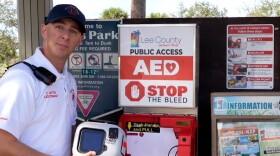Republican incumbent Sen. Rick Scott will return to his U.S. Senate seat after coasting to victory over Democrat Debbie Mucarsel-Powell on Tuesday night in an election that will help secure his party's control of the Senate.
The Associated Press called the race for Scott at 8:01 p.m. just after polls statewide closed.
Scott, one of the richest members of Congress, pumped millions of dollars of his own money into the race, as he has with his previous three elections.
Murcarsel-Powell struggled to gain attention. She collected little financial support from national Democrats until the last few weeks of the race and had little name recognition outside South Florida.
The Senate race featured no debates. Scott declined repeated invitations from Mucarsel-Powell.
Still, some late polls showed Scott in a closer race than most analysts expected against Mucarsel-Powell, an immigrant from Ecuador and former congresswoman. She's currently a senior advisor at the national gun control advocacy group Giffords.
One major factor helping Scott: Florida's massive Republican registration voter advantage.
The GOP overtook Democrats in registration after the 2020 election, and that advantage grew to a lead of about 1 million voters as of August. The latest data showed 13.8 million registered voters: about 39% Republicans; about 32% Democrats, and 26% unaffiliated.
Registered Democrats had outnumbered registered Republicans in Florida for at least 50 years dating back to the early 1970s.
Tuesday night's margin, at least based on early returns, would represent his largest margin of victory in his political career.
Scott, who served two terms as governor, had won each of his previous statewide elections with less than 50% of the vote.
In 2018, he defeated incumbent Democratic Sen. Bill Nelson in a race decided by 0.2 percentage points. But Florida politics changed. The last time Scott was on the ballot, Democrats outnumbered Republicans in the state. Republicans now have a million-voter advantage.
Four in 10 Florida voters said the economy and jobs is the top issue facing the country, according to AP VoteCast, a sweeping survey of more than 110,000 voters nationally, including more than 4,700 voters in Florida. About 2 in 10 Florida voters said immigration is the most pressing issue, and about 1 in 10 named abortion.







